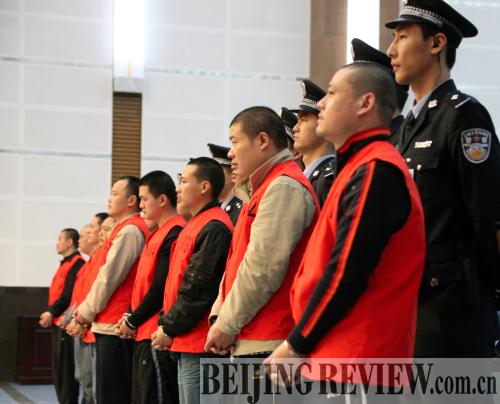|
 |
|
FACING JUSTICE: A nine-member gang goes to trial on October 21 at the Chongqing No.1 Intermediate Court. Two members were sentenced to death, two received death sentences with a reprieve and the other five received jail terms (XINHUA) |
According to the police, many government officials are also gang leaders. Li Qiang, who is said to be the richest gangster and has accrued roughly 1 billion yuan ($146.4 million) by running bus and real estate companies, is the former delegate of the Chongqing Municipal People's Congress.
Above the law
Under the protection of these officials, the gangs wantonly violated laws, procuratorate officials said. Xie Caiping, Wen's sister-in-law and the only female leader among the 19 gangs, formed a 22-member outfit to operate underground gambling dens in 2000, when she was still an official in the Chongqing Taxation Bureau. In 2006, Xie was dismissed from the bureau and opened more than 80 illicit casinos in the city. She also provided space for people taking illegal narcotics. One of the casinos was located on the city's busiest street, opposite the Chongqing Higher People's Court.
"My brother-in-law is God and he is the law. No one can do anything to me even if I killed people or operated casinos. What do I need to fear?" Xie said in 2000, according to China Youth Daily.
The mafia-style gangs also included youngsters. Zhang Bo and Zhang Tao, twin brothers born in 1986, were the leaders of a 24-member gang. They have so far been the youngest gang bosses seized. Most of their underlings also were born in the 1980s, with the youngest one being born in 1989. The twin brothers went on trial in Chongqing's No.2 Intermediate People's Court on October 19.
The group started with 14 members in 2007, and since then they have repeatedly committed crimes in the city's Wanzhou District. Each member of the group was equipped with knives and was required to commit crimes to increase their courage. The twin brothers, who were originally shoemakers in a factory, said they started to gamble because they were not satisfied with the salary they got in the factory and then started opening gambling dens. They are accused of organizing and leading a gang, running illegal gambling dens, injuring people, destroying others' possessions and false imprisonment.
A national campaign
The Chongqing crackdown earned residents' praise. In a survey conducted recently on whether Chongqing's citizens feel safer after the campaign, 92 percent of respondents said they feel much safer than before. They say they can now walk the streets alone at night and do not worry about being victims when taking buses.
Similar campaigns, which have been happening across the nation in every province and municipality, have won significant achievements, according to the Ministry of Public Security (MPS). From January 2006 to July 2009, public security bureaus around the country cracked down on more than 13,000 gangs that involved more than 90,000 gangsters, MPS statistics show. |
